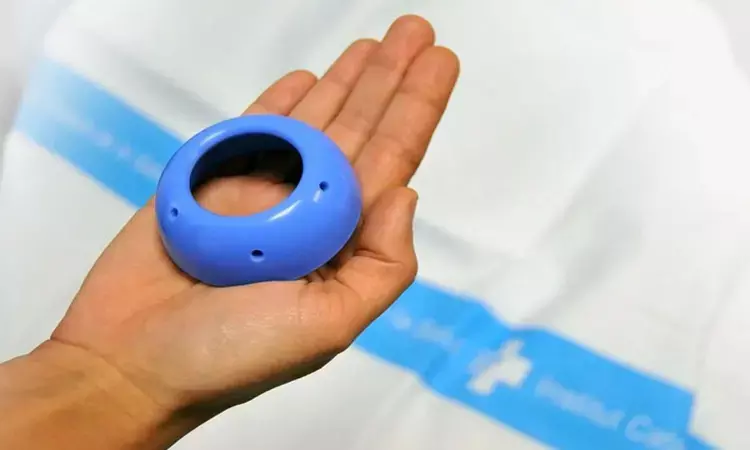- Home
- Medical news & Guidelines
- Anesthesiology
- Cardiology and CTVS
- Critical Care
- Dentistry
- Dermatology
- Diabetes and Endocrinology
- ENT
- Gastroenterology
- Medicine
- Nephrology
- Neurology
- Obstretics-Gynaecology
- Oncology
- Ophthalmology
- Orthopaedics
- Pediatrics-Neonatology
- Psychiatry
- Pulmonology
- Radiology
- Surgery
- Urology
- Laboratory Medicine
- Diet
- Nursing
- Paramedical
- Physiotherapy
- Health news
- Fact Check
- Bone Health Fact Check
- Brain Health Fact Check
- Cancer Related Fact Check
- Child Care Fact Check
- Dental and oral health fact check
- Diabetes and metabolic health fact check
- Diet and Nutrition Fact Check
- Eye and ENT Care Fact Check
- Fitness fact check
- Gut health fact check
- Heart health fact check
- Kidney health fact check
- Medical education fact check
- Men's health fact check
- Respiratory fact check
- Skin and hair care fact check
- Vaccine and Immunization fact check
- Women's health fact check
- AYUSH
- State News
- Andaman and Nicobar Islands
- Andhra Pradesh
- Arunachal Pradesh
- Assam
- Bihar
- Chandigarh
- Chattisgarh
- Dadra and Nagar Haveli
- Daman and Diu
- Delhi
- Goa
- Gujarat
- Haryana
- Himachal Pradesh
- Jammu & Kashmir
- Jharkhand
- Karnataka
- Kerala
- Ladakh
- Lakshadweep
- Madhya Pradesh
- Maharashtra
- Manipur
- Meghalaya
- Mizoram
- Nagaland
- Odisha
- Puducherry
- Punjab
- Rajasthan
- Sikkim
- Tamil Nadu
- Telangana
- Tripura
- Uttar Pradesh
- Uttrakhand
- West Bengal
- Medical Education
- Industry
Patients Prefer Lidocaine Jelly, During Pessary Maintenance despite No Obvious Pain Reduction: Study

A recent clinical trial published in the American Journal of Obstetrics and Gynecology no significant effect of Lidocaine HCl 2% jelly in reducing pain during pessary removal and reinsertion when compared to standard lubricating jelly. Pelvic organ prolapse (POP) and stress urinary incontinence are common conditions affecting women who are postmenopausal. Vaginal pessaries are a common non-surgical treatment option. However, pessary maintenance, which involves periodic removal, cleaning, and reinsertion, can be uncomfortable or painful for patients. Thereby, this study was conducted between September 2022 and June 2023 to provide insight into whether lidocaine jelly could offer superior pain management during routine pessary maintenance exams.
The randomized clinical trial included a total of 66 participants, all of whom used vaginal pessaries for POP or urinary incontinence. The participants were randomly assigned to receive either 5cc of Lidocaine HCl 2% jelly or a water-based lubricating jelly five minutes before their pessary removal. The primary goal of the study was to measure the pain levels of participants using the visual analog scale (VAS) during pessary removal and reinsertion. The VAS scores ranged from 0 to 10 and were recorded at baseline, during pessary removal, and during reinsertion.
The results showed that pain levels at pessary removal were low in both groups. The average VAS pain score for the lubricating jelly group was 3.23 cm, while the lidocaine jelly group reported an average score of 2.66 cm. After adjusting for baseline pain, there was no significant difference in pain relief between the two groups (mean difference=-0.56 cm, 95% CI: -1.97 to 0.85; p=0.44).
While lidocaine jelly did not provide superior pain relief, the study revealed that a significant proportion of participants (71.2%) expressed a preference for numbing jelly during future pessary exams, regardless of its actual impact on pain scores. Most of the participants in the study were postmenopausal and reported satisfaction with their pessary use, despite the discomfort associated with maintenance. Overall, these findings of this study suggest that while Lidocaine HCl 2% jelly is not significantly more effective than lubricating jelly in reducing pain, patient preferences for numbing agents during exams may still play a critical role in treatment plans.
Reference:
JACKSON, A. A., FRISCO, S. C., LYNCH, C. M., TANNER, J. P., & PROPST, K. (2024). Topical Lidocaine for Pessary Removal and Reinsertion Pain Reduction: A Randomized Clinical Trial. In American Journal of Obstetrics and Gynecology. Elsevier BV. https://doi.org/10.1016/j.ajog.2024.09.004
Neuroscience Masters graduate
Jacinthlyn Sylvia, a Neuroscience Master's graduate from Chennai has worked extensively in deciphering the neurobiology of cognition and motor control in aging. She also has spread-out exposure to Neurosurgery from her Bachelor’s. She is currently involved in active Neuro-Oncology research. She is an upcoming neuroscientist with a fiery passion for writing. Her news cover at Medical Dialogues feature recent discoveries and updates from the healthcare and biomedical research fields. She can be reached at editorial@medicaldialogues.in
Dr Kamal Kant Kohli-MBBS, DTCD- a chest specialist with more than 30 years of practice and a flair for writing clinical articles, Dr Kamal Kant Kohli joined Medical Dialogues as a Chief Editor of Medical News. Besides writing articles, as an editor, he proofreads and verifies all the medical content published on Medical Dialogues including those coming from journals, studies,medical conferences,guidelines etc. Email: drkohli@medicaldialogues.in. Contact no. 011-43720751


